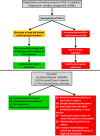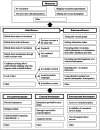The use of mechanistic reasoning in assessing coronavirus interventions
- PMID: 32666676
- PMCID: PMC7405225
- DOI: 10.1111/jep.13438
The use of mechanistic reasoning in assessing coronavirus interventions
Abstract
Rationale: Evidence-based medicine (EBM), the dominant approach to assessing the effectiveness of clinical and public health interventions, focuses on the results of association studies. EBM+ is a development of EBM that systematically considers mechanistic studies alongside association studies.
Aims and objectives: To explore examples of the importance of mechanistic evidence to coronavirus research.
Methods: We have reviewed the mechanistic evidence in four major areas that are relevant to the management of COVID-19.
Results and conclusions: (a) Assessment of combination therapy for MERS highlights the need for systematic assessment of mechanistic evidence. (b) That hypertension is a risk factor for severe disease in the case of SARS-CoV-2 suggests that altering hypertension treatment might alleviate disease, but the mechanisms are complex, and it is essential to consider and evaluate multiple mechanistic hypotheses. (c) Confidence that public health interventions will be effective requires a detailed assessment of social and psychological components of the mechanisms of their action, in addition to mechanisms of disease. (d) In particular, if vaccination programmes are to be effective, they must be carefully tailored to the social context; again, mechanistic evidence is crucial. We conclude that coronavirus research is best situated within the EBM+ evaluation framework.
Keywords: coronavirus; evidence-based medicine; mechanisms; mechanistic reasoning.
© 2020 The Authors. Journal of Evaluation in Clinical Practice published by John Wiley & Sons Ltd.
Conflict of interest statement
The authors declare no conflict of interest.
Figures



References
-
- Guyatt G, Cairns J, Churchill D, et al. Evidence‐based medicine. A new approach to teaching the practice of medicine. JAMA. 1992;268(17):2420‐2425. - PubMed
-
- Parkkinen V‐P, Wallmann C, Wilde M, et al. Evaluating Evidence of Mechanisms in Medicine: Principles and Procedures. Cham, Switzerland: Springer; 2018. - PubMed
-
- Williamson J. The feasibility and malleability of EBM+. Theoria. An International Journal for Theory, History and Foundations of Science. 2020. 10.1387/theoria.21244. - DOI
Publication types
MeSH terms
Grants and funding
LinkOut - more resources
Full Text Sources
Medical
Miscellaneous

